Organisational Behaviour Report: BBC's Culture, Motivation, and Teams
VerifiedAdded on 2020/06/04
|13
|4293
|32
Report
AI Summary
This report provides an in-depth analysis of organisational behaviour within the BBC. It begins by examining the company's culture using Charles Handy's cultural typology, exploring power, task, person, and role cultures, and how these influence employee behaviour. The report then investigates the impact of culture, politics, and power on individual performance within the BBC. It delves into content and process theories of motivation, including Maslow's Hierarchy of Needs, McClelland's Motivational Theory, Herzberg's Two-Factor Theory, and Vroom's Expectancy Theory, evaluating how motivational techniques enhance effectiveness and contribute to the achievement of organisational goals. The report also explores different types of teams and their significance, along with the qualities of effective teams and the Tuckman model of team development. Finally, it discusses organisational theory to improve productivity and team performance, identifies barriers to effective performance, and offers concluding remarks on the key findings.
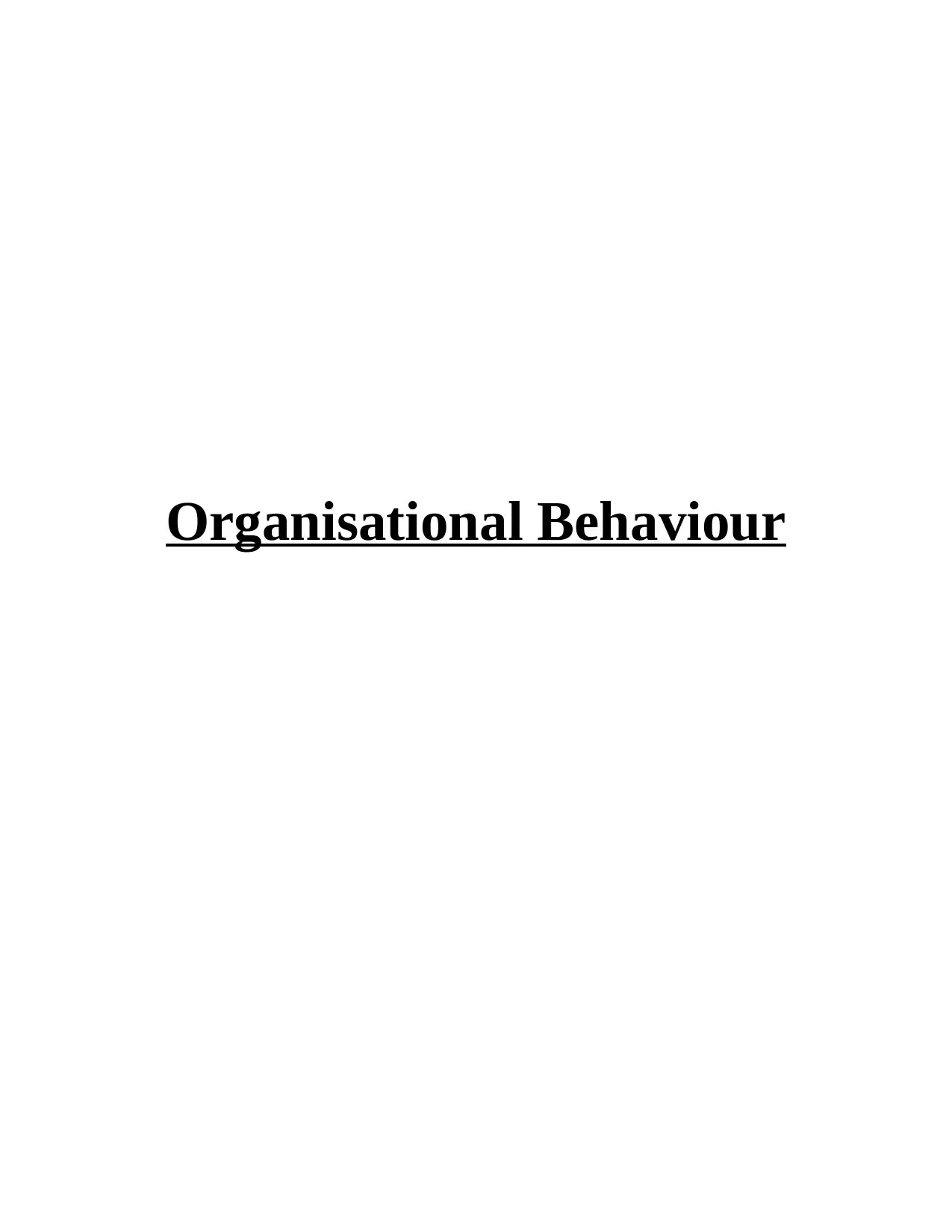
Organisational Behaviour
Paraphrase This Document
Need a fresh take? Get an instant paraphrase of this document with our AI Paraphraser
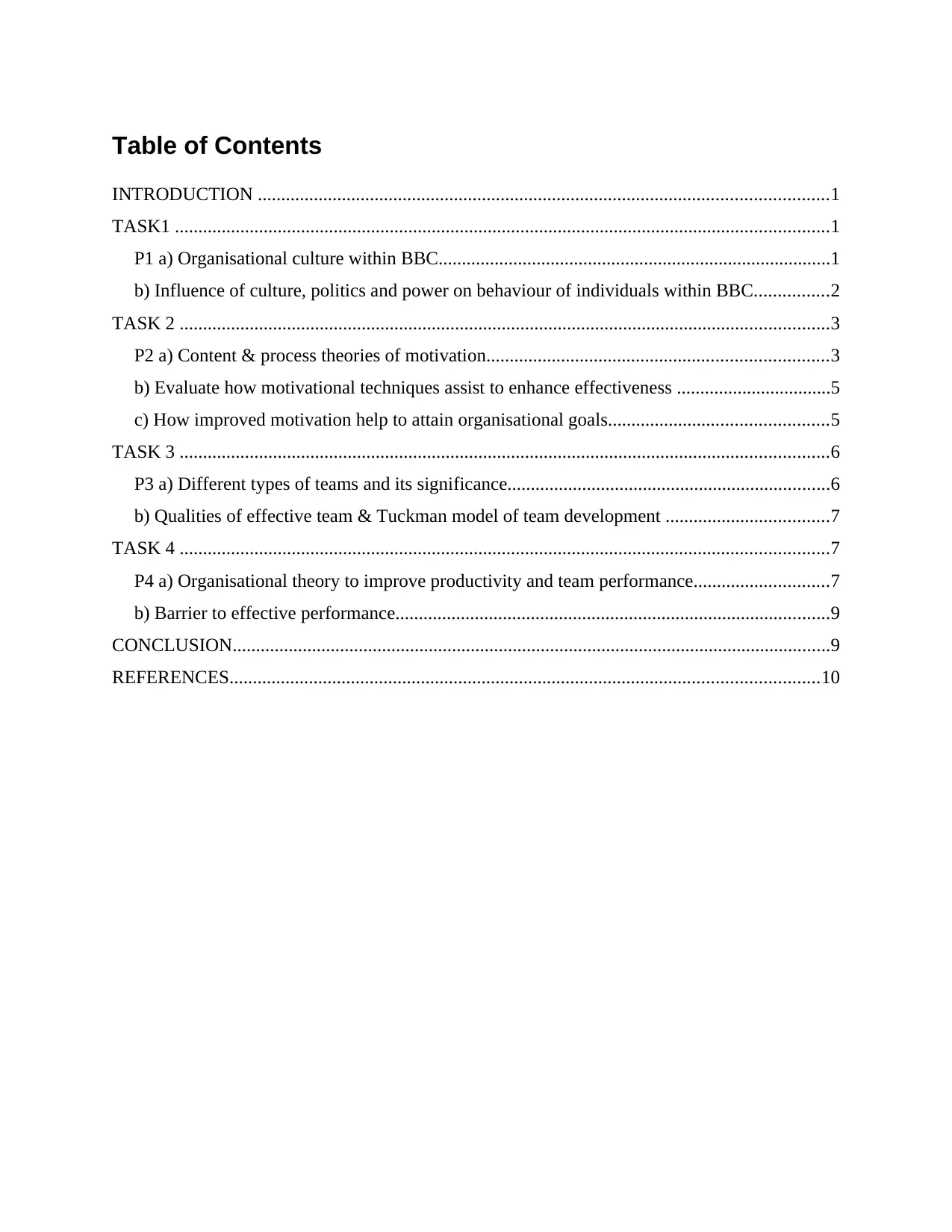
Table of Contents
INTRODUCTION ..........................................................................................................................1
TASK1 ............................................................................................................................................1
P1 a) Organisational culture within BBC....................................................................................1
b) Influence of culture, politics and power on behaviour of individuals within BBC................2
TASK 2 ...........................................................................................................................................3
P2 a) Content & process theories of motivation.........................................................................3
b) Evaluate how motivational techniques assist to enhance effectiveness .................................5
c) How improved motivation help to attain organisational goals...............................................5
TASK 3 ...........................................................................................................................................6
P3 a) Different types of teams and its significance.....................................................................6
b) Qualities of effective team & Tuckman model of team development ...................................7
TASK 4 ...........................................................................................................................................7
P4 a) Organisational theory to improve productivity and team performance.............................7
b) Barrier to effective performance.............................................................................................9
CONCLUSION................................................................................................................................9
REFERENCES..............................................................................................................................10
INTRODUCTION ..........................................................................................................................1
TASK1 ............................................................................................................................................1
P1 a) Organisational culture within BBC....................................................................................1
b) Influence of culture, politics and power on behaviour of individuals within BBC................2
TASK 2 ...........................................................................................................................................3
P2 a) Content & process theories of motivation.........................................................................3
b) Evaluate how motivational techniques assist to enhance effectiveness .................................5
c) How improved motivation help to attain organisational goals...............................................5
TASK 3 ...........................................................................................................................................6
P3 a) Different types of teams and its significance.....................................................................6
b) Qualities of effective team & Tuckman model of team development ...................................7
TASK 4 ...........................................................................................................................................7
P4 a) Organisational theory to improve productivity and team performance.............................7
b) Barrier to effective performance.............................................................................................9
CONCLUSION................................................................................................................................9
REFERENCES..............................................................................................................................10
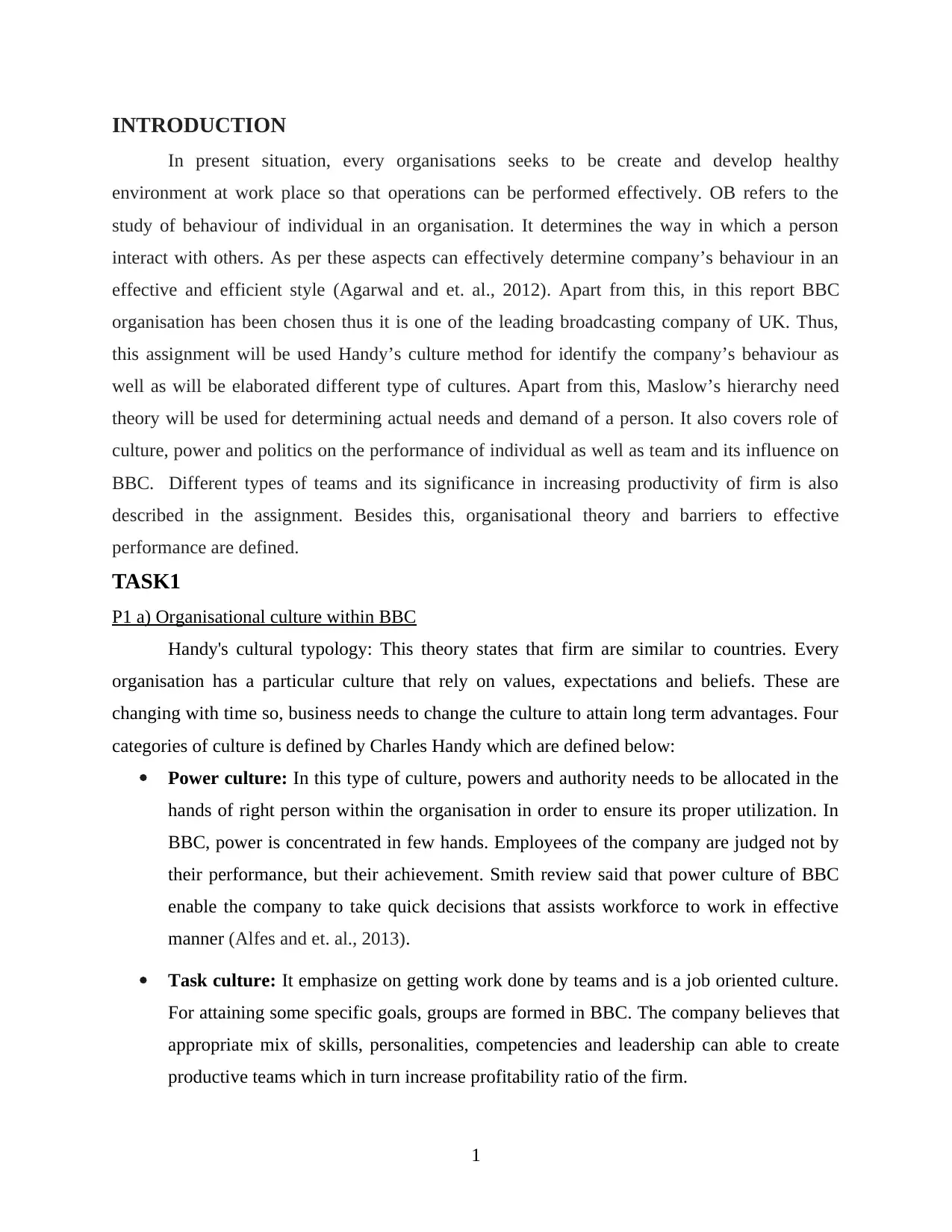
INTRODUCTION
In present situation, every organisations seeks to be create and develop healthy
environment at work place so that operations can be performed effectively. OB refers to the
study of behaviour of individual in an organisation. It determines the way in which a person
interact with others. As per these aspects can effectively determine company’s behaviour in an
effective and efficient style (Agarwal and et. al., 2012). Apart from this, in this report BBC
organisation has been chosen thus it is one of the leading broadcasting company of UK. Thus,
this assignment will be used Handy’s culture method for identify the company’s behaviour as
well as will be elaborated different type of cultures. Apart from this, Maslow’s hierarchy need
theory will be used for determining actual needs and demand of a person. It also covers role of
culture, power and politics on the performance of individual as well as team and its influence on
BBC. Different types of teams and its significance in increasing productivity of firm is also
described in the assignment. Besides this, organisational theory and barriers to effective
performance are defined.
TASK1
P1 a) Organisational culture within BBC
Handy's cultural typology: This theory states that firm are similar to countries. Every
organisation has a particular culture that rely on values, expectations and beliefs. These are
changing with time so, business needs to change the culture to attain long term advantages. Four
categories of culture is defined by Charles Handy which are defined below:
Power culture: In this type of culture, powers and authority needs to be allocated in the
hands of right person within the organisation in order to ensure its proper utilization. In
BBC, power is concentrated in few hands. Employees of the company are judged not by
their performance, but their achievement. Smith review said that power culture of BBC
enable the company to take quick decisions that assists workforce to work in effective
manner (Alfes and et. al., 2013).
Task culture: It emphasize on getting work done by teams and is a job oriented culture.
For attaining some specific goals, groups are formed in BBC. The company believes that
appropriate mix of skills, personalities, competencies and leadership can able to create
productive teams which in turn increase profitability ratio of the firm.
1
In present situation, every organisations seeks to be create and develop healthy
environment at work place so that operations can be performed effectively. OB refers to the
study of behaviour of individual in an organisation. It determines the way in which a person
interact with others. As per these aspects can effectively determine company’s behaviour in an
effective and efficient style (Agarwal and et. al., 2012). Apart from this, in this report BBC
organisation has been chosen thus it is one of the leading broadcasting company of UK. Thus,
this assignment will be used Handy’s culture method for identify the company’s behaviour as
well as will be elaborated different type of cultures. Apart from this, Maslow’s hierarchy need
theory will be used for determining actual needs and demand of a person. It also covers role of
culture, power and politics on the performance of individual as well as team and its influence on
BBC. Different types of teams and its significance in increasing productivity of firm is also
described in the assignment. Besides this, organisational theory and barriers to effective
performance are defined.
TASK1
P1 a) Organisational culture within BBC
Handy's cultural typology: This theory states that firm are similar to countries. Every
organisation has a particular culture that rely on values, expectations and beliefs. These are
changing with time so, business needs to change the culture to attain long term advantages. Four
categories of culture is defined by Charles Handy which are defined below:
Power culture: In this type of culture, powers and authority needs to be allocated in the
hands of right person within the organisation in order to ensure its proper utilization. In
BBC, power is concentrated in few hands. Employees of the company are judged not by
their performance, but their achievement. Smith review said that power culture of BBC
enable the company to take quick decisions that assists workforce to work in effective
manner (Alfes and et. al., 2013).
Task culture: It emphasize on getting work done by teams and is a job oriented culture.
For attaining some specific goals, groups are formed in BBC. The company believes that
appropriate mix of skills, personalities, competencies and leadership can able to create
productive teams which in turn increase profitability ratio of the firm.
1
⊘ This is a preview!⊘
Do you want full access?
Subscribe today to unlock all pages.

Trusted by 1+ million students worldwide
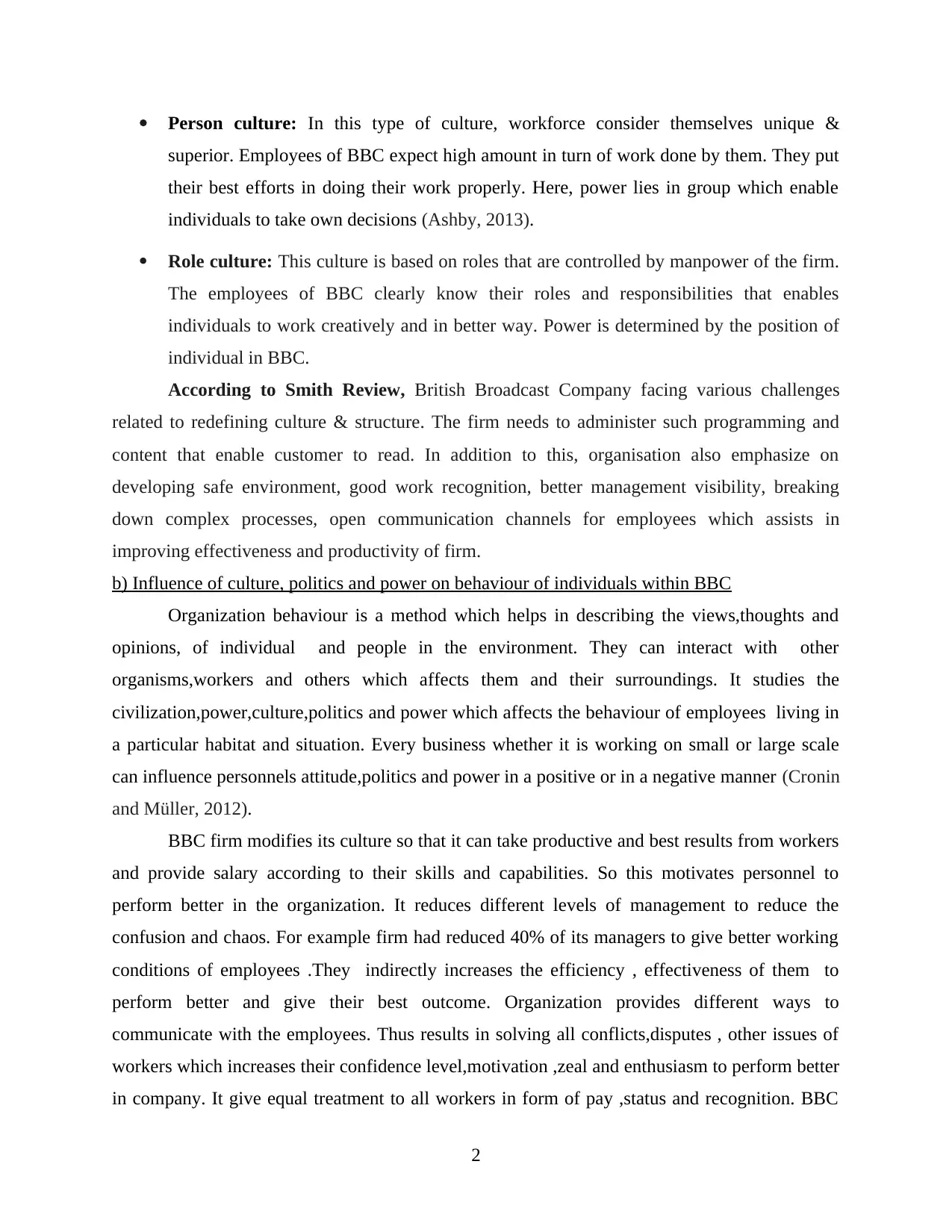
Person culture: In this type of culture, workforce consider themselves unique &
superior. Employees of BBC expect high amount in turn of work done by them. They put
their best efforts in doing their work properly. Here, power lies in group which enable
individuals to take own decisions (Ashby, 2013).
Role culture: This culture is based on roles that are controlled by manpower of the firm.
The employees of BBC clearly know their roles and responsibilities that enables
individuals to work creatively and in better way. Power is determined by the position of
individual in BBC.
According to Smith Review, British Broadcast Company facing various challenges
related to redefining culture & structure. The firm needs to administer such programming and
content that enable customer to read. In addition to this, organisation also emphasize on
developing safe environment, good work recognition, better management visibility, breaking
down complex processes, open communication channels for employees which assists in
improving effectiveness and productivity of firm.
b) Influence of culture, politics and power on behaviour of individuals within BBC
Organization behaviour is a method which helps in describing the views,thoughts and
opinions, of individual and people in the environment. They can interact with other
organisms,workers and others which affects them and their surroundings. It studies the
civilization,power,culture,politics and power which affects the behaviour of employees living in
a particular habitat and situation. Every business whether it is working on small or large scale
can influence personnels attitude,politics and power in a positive or in a negative manner (Cronin
and Müller, 2012).
BBC firm modifies its culture so that it can take productive and best results from workers
and provide salary according to their skills and capabilities. So this motivates personnel to
perform better in the organization. It reduces different levels of management to reduce the
confusion and chaos. For example firm had reduced 40% of its managers to give better working
conditions of employees .They indirectly increases the efficiency , effectiveness of them to
perform better and give their best outcome. Organization provides different ways to
communicate with the employees. Thus results in solving all conflicts,disputes , other issues of
workers which increases their confidence level,motivation ,zeal and enthusiasm to perform better
in company. It give equal treatment to all workers in form of pay ,status and recognition. BBC
2
superior. Employees of BBC expect high amount in turn of work done by them. They put
their best efforts in doing their work properly. Here, power lies in group which enable
individuals to take own decisions (Ashby, 2013).
Role culture: This culture is based on roles that are controlled by manpower of the firm.
The employees of BBC clearly know their roles and responsibilities that enables
individuals to work creatively and in better way. Power is determined by the position of
individual in BBC.
According to Smith Review, British Broadcast Company facing various challenges
related to redefining culture & structure. The firm needs to administer such programming and
content that enable customer to read. In addition to this, organisation also emphasize on
developing safe environment, good work recognition, better management visibility, breaking
down complex processes, open communication channels for employees which assists in
improving effectiveness and productivity of firm.
b) Influence of culture, politics and power on behaviour of individuals within BBC
Organization behaviour is a method which helps in describing the views,thoughts and
opinions, of individual and people in the environment. They can interact with other
organisms,workers and others which affects them and their surroundings. It studies the
civilization,power,culture,politics and power which affects the behaviour of employees living in
a particular habitat and situation. Every business whether it is working on small or large scale
can influence personnels attitude,politics and power in a positive or in a negative manner (Cronin
and Müller, 2012).
BBC firm modifies its culture so that it can take productive and best results from workers
and provide salary according to their skills and capabilities. So this motivates personnel to
perform better in the organization. It reduces different levels of management to reduce the
confusion and chaos. For example firm had reduced 40% of its managers to give better working
conditions of employees .They indirectly increases the efficiency , effectiveness of them to
perform better and give their best outcome. Organization provides different ways to
communicate with the employees. Thus results in solving all conflicts,disputes , other issues of
workers which increases their confidence level,motivation ,zeal and enthusiasm to perform better
in company. It give equal treatment to all workers in form of pay ,status and recognition. BBC
2
Paraphrase This Document
Need a fresh take? Get an instant paraphrase of this document with our AI Paraphraser
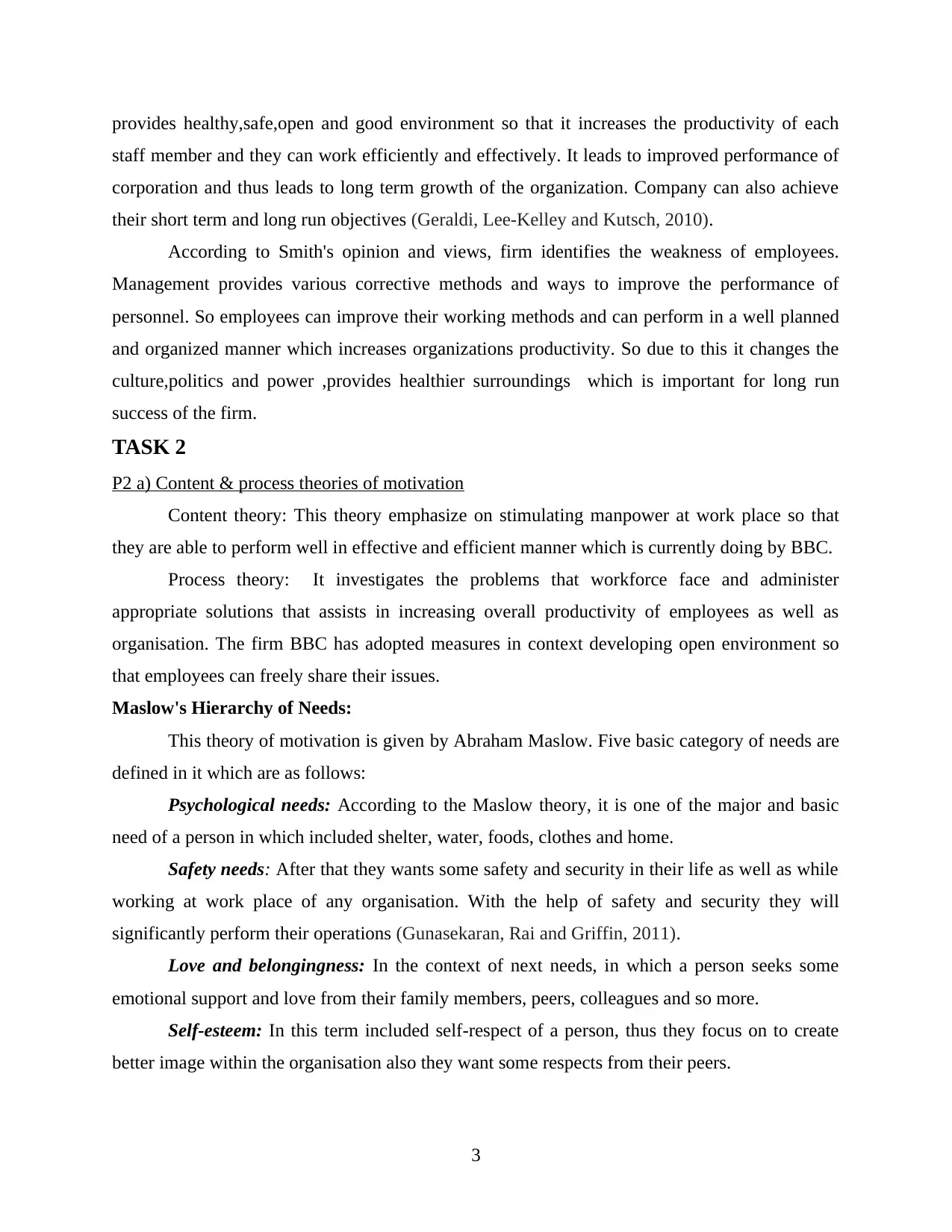
provides healthy,safe,open and good environment so that it increases the productivity of each
staff member and they can work efficiently and effectively. It leads to improved performance of
corporation and thus leads to long term growth of the organization. Company can also achieve
their short term and long run objectives (Geraldi, Lee-Kelley and Kutsch, 2010).
According to Smith's opinion and views, firm identifies the weakness of employees.
Management provides various corrective methods and ways to improve the performance of
personnel. So employees can improve their working methods and can perform in a well planned
and organized manner which increases organizations productivity. So due to this it changes the
culture,politics and power ,provides healthier surroundings which is important for long run
success of the firm.
TASK 2
P2 a) Content & process theories of motivation
Content theory: This theory emphasize on stimulating manpower at work place so that
they are able to perform well in effective and efficient manner which is currently doing by BBC.
Process theory: It investigates the problems that workforce face and administer
appropriate solutions that assists in increasing overall productivity of employees as well as
organisation. The firm BBC has adopted measures in context developing open environment so
that employees can freely share their issues.
Maslow's Hierarchy of Needs:
This theory of motivation is given by Abraham Maslow. Five basic category of needs are
defined in it which are as follows:
Psychological needs: According to the Maslow theory, it is one of the major and basic
need of a person in which included shelter, water, foods, clothes and home.
Safety needs: After that they wants some safety and security in their life as well as while
working at work place of any organisation. With the help of safety and security they will
significantly perform their operations (Gunasekaran, Rai and Griffin, 2011).
Love and belongingness: In the context of next needs, in which a person seeks some
emotional support and love from their family members, peers, colleagues and so more.
Self-esteem: In this term included self-respect of a person, thus they focus on to create
better image within the organisation also they want some respects from their peers.
3
staff member and they can work efficiently and effectively. It leads to improved performance of
corporation and thus leads to long term growth of the organization. Company can also achieve
their short term and long run objectives (Geraldi, Lee-Kelley and Kutsch, 2010).
According to Smith's opinion and views, firm identifies the weakness of employees.
Management provides various corrective methods and ways to improve the performance of
personnel. So employees can improve their working methods and can perform in a well planned
and organized manner which increases organizations productivity. So due to this it changes the
culture,politics and power ,provides healthier surroundings which is important for long run
success of the firm.
TASK 2
P2 a) Content & process theories of motivation
Content theory: This theory emphasize on stimulating manpower at work place so that
they are able to perform well in effective and efficient manner which is currently doing by BBC.
Process theory: It investigates the problems that workforce face and administer
appropriate solutions that assists in increasing overall productivity of employees as well as
organisation. The firm BBC has adopted measures in context developing open environment so
that employees can freely share their issues.
Maslow's Hierarchy of Needs:
This theory of motivation is given by Abraham Maslow. Five basic category of needs are
defined in it which are as follows:
Psychological needs: According to the Maslow theory, it is one of the major and basic
need of a person in which included shelter, water, foods, clothes and home.
Safety needs: After that they wants some safety and security in their life as well as while
working at work place of any organisation. With the help of safety and security they will
significantly perform their operations (Gunasekaran, Rai and Griffin, 2011).
Love and belongingness: In the context of next needs, in which a person seeks some
emotional support and love from their family members, peers, colleagues and so more.
Self-esteem: In this term included self-respect of a person, thus they focus on to create
better image within the organisation also they want some respects from their peers.
3
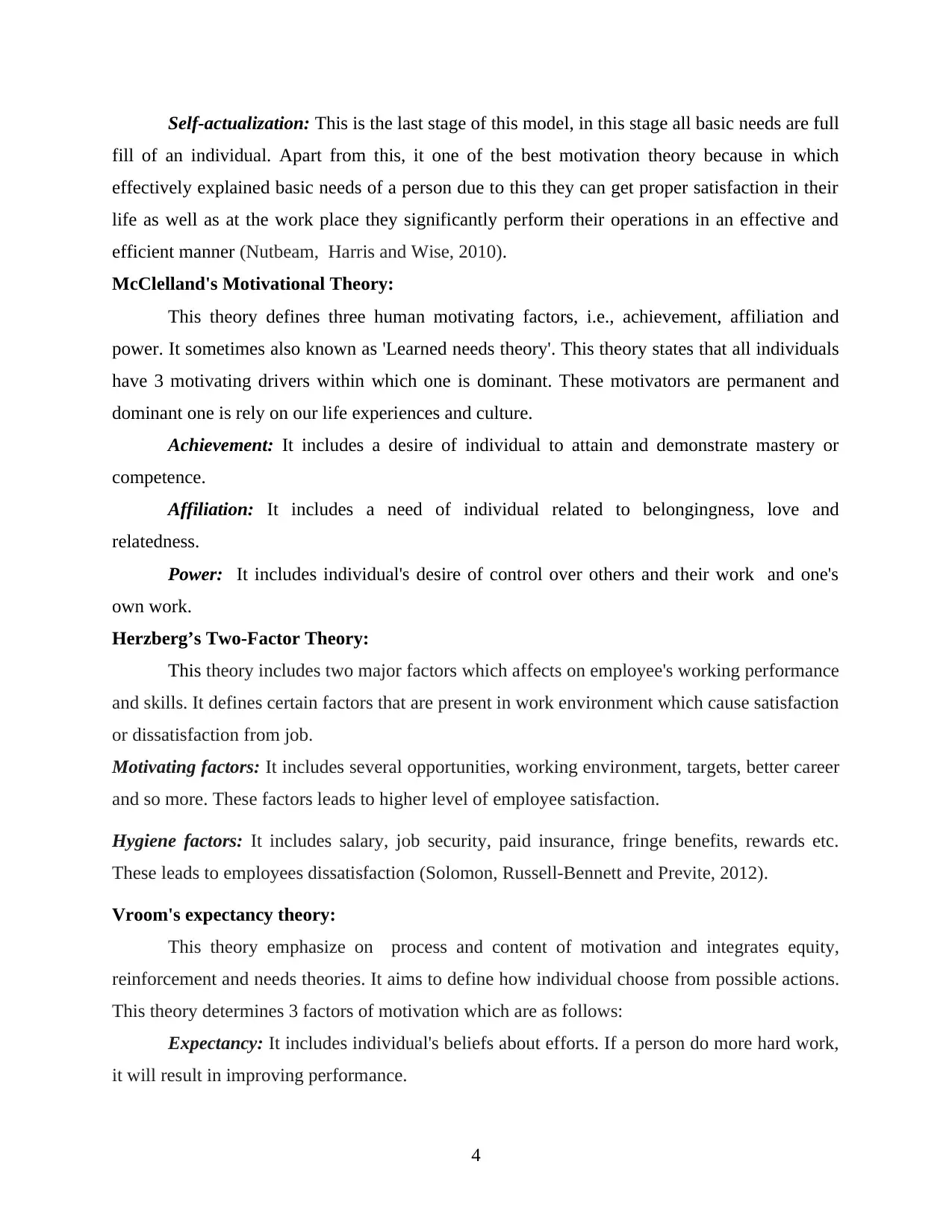
Self-actualization: This is the last stage of this model, in this stage all basic needs are full
fill of an individual. Apart from this, it one of the best motivation theory because in which
effectively explained basic needs of a person due to this they can get proper satisfaction in their
life as well as at the work place they significantly perform their operations in an effective and
efficient manner (Nutbeam, Harris and Wise, 2010).
McClelland's Motivational Theory:
This theory defines three human motivating factors, i.e., achievement, affiliation and
power. It sometimes also known as 'Learned needs theory'. This theory states that all individuals
have 3 motivating drivers within which one is dominant. These motivators are permanent and
dominant one is rely on our life experiences and culture.
Achievement: It includes a desire of individual to attain and demonstrate mastery or
competence.
Affiliation: It includes a need of individual related to belongingness, love and
relatedness.
Power: It includes individual's desire of control over others and their work and one's
own work.
Herzberg’s Two-Factor Theory:
This theory includes two major factors which affects on employee's working performance
and skills. It defines certain factors that are present in work environment which cause satisfaction
or dissatisfaction from job.
Motivating factors: It includes several opportunities, working environment, targets, better career
and so more. These factors leads to higher level of employee satisfaction.
Hygiene factors: It includes salary, job security, paid insurance, fringe benefits, rewards etc.
These leads to employees dissatisfaction (Solomon, Russell-Bennett and Previte, 2012).
Vroom's expectancy theory:
This theory emphasize on process and content of motivation and integrates equity,
reinforcement and needs theories. It aims to define how individual choose from possible actions.
This theory determines 3 factors of motivation which are as follows:
Expectancy: It includes individual's beliefs about efforts. If a person do more hard work,
it will result in improving performance.
4
fill of an individual. Apart from this, it one of the best motivation theory because in which
effectively explained basic needs of a person due to this they can get proper satisfaction in their
life as well as at the work place they significantly perform their operations in an effective and
efficient manner (Nutbeam, Harris and Wise, 2010).
McClelland's Motivational Theory:
This theory defines three human motivating factors, i.e., achievement, affiliation and
power. It sometimes also known as 'Learned needs theory'. This theory states that all individuals
have 3 motivating drivers within which one is dominant. These motivators are permanent and
dominant one is rely on our life experiences and culture.
Achievement: It includes a desire of individual to attain and demonstrate mastery or
competence.
Affiliation: It includes a need of individual related to belongingness, love and
relatedness.
Power: It includes individual's desire of control over others and their work and one's
own work.
Herzberg’s Two-Factor Theory:
This theory includes two major factors which affects on employee's working performance
and skills. It defines certain factors that are present in work environment which cause satisfaction
or dissatisfaction from job.
Motivating factors: It includes several opportunities, working environment, targets, better career
and so more. These factors leads to higher level of employee satisfaction.
Hygiene factors: It includes salary, job security, paid insurance, fringe benefits, rewards etc.
These leads to employees dissatisfaction (Solomon, Russell-Bennett and Previte, 2012).
Vroom's expectancy theory:
This theory emphasize on process and content of motivation and integrates equity,
reinforcement and needs theories. It aims to define how individual choose from possible actions.
This theory determines 3 factors of motivation which are as follows:
Expectancy: It includes individual's beliefs about efforts. If a person do more hard work,
it will result in improving performance.
4
⊘ This is a preview!⊘
Do you want full access?
Subscribe today to unlock all pages.

Trusted by 1+ million students worldwide
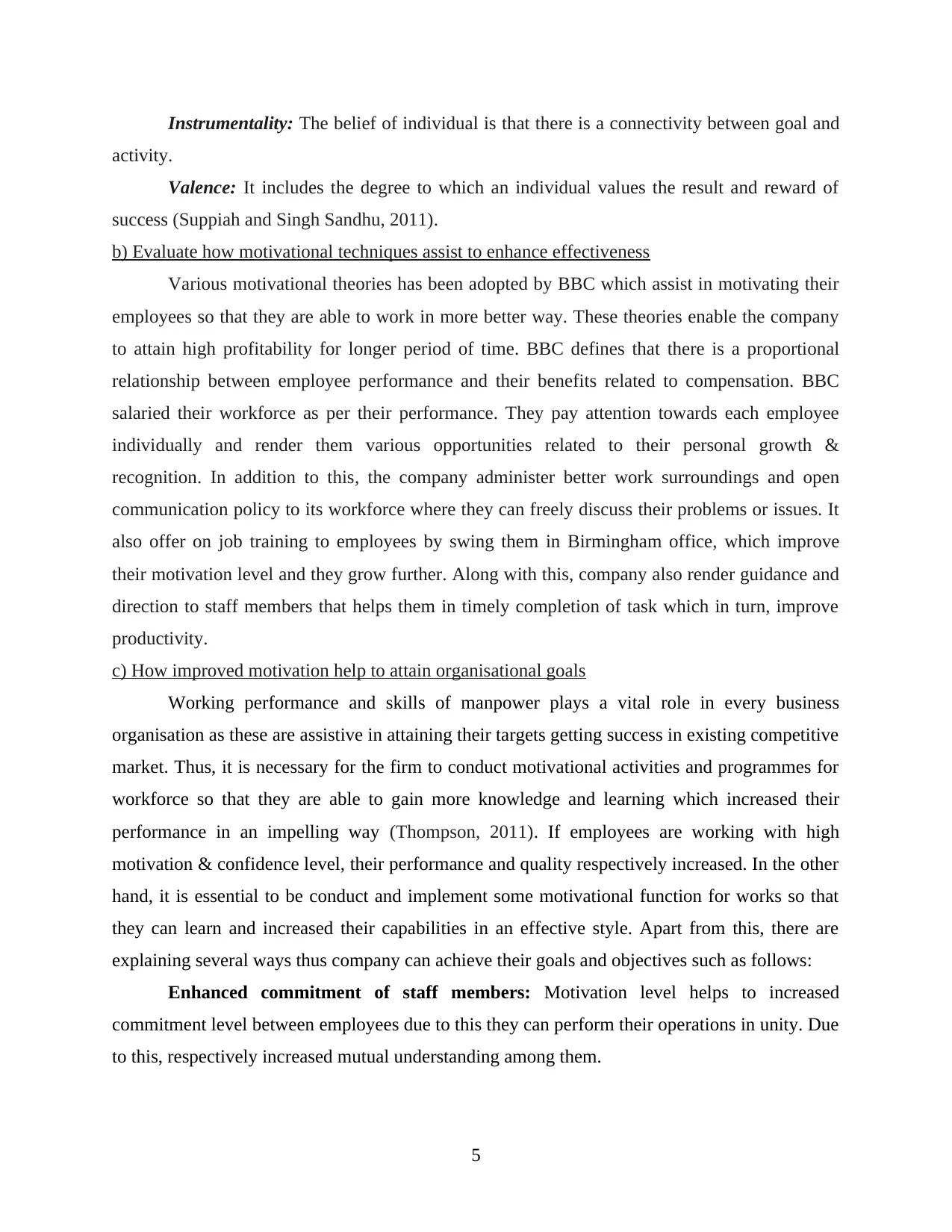
Instrumentality: The belief of individual is that there is a connectivity between goal and
activity.
Valence: It includes the degree to which an individual values the result and reward of
success (Suppiah and Singh Sandhu, 2011).
b) Evaluate how motivational techniques assist to enhance effectiveness
Various motivational theories has been adopted by BBC which assist in motivating their
employees so that they are able to work in more better way. These theories enable the company
to attain high profitability for longer period of time. BBC defines that there is a proportional
relationship between employee performance and their benefits related to compensation. BBC
salaried their workforce as per their performance. They pay attention towards each employee
individually and render them various opportunities related to their personal growth &
recognition. In addition to this, the company administer better work surroundings and open
communication policy to its workforce where they can freely discuss their problems or issues. It
also offer on job training to employees by swing them in Birmingham office, which improve
their motivation level and they grow further. Along with this, company also render guidance and
direction to staff members that helps them in timely completion of task which in turn, improve
productivity.
c) How improved motivation help to attain organisational goals
Working performance and skills of manpower plays a vital role in every business
organisation as these are assistive in attaining their targets getting success in existing competitive
market. Thus, it is necessary for the firm to conduct motivational activities and programmes for
workforce so that they are able to gain more knowledge and learning which increased their
performance in an impelling way (Thompson, 2011). If employees are working with high
motivation & confidence level, their performance and quality respectively increased. In the other
hand, it is essential to be conduct and implement some motivational function for works so that
they can learn and increased their capabilities in an effective style. Apart from this, there are
explaining several ways thus company can achieve their goals and objectives such as follows:
Enhanced commitment of staff members: Motivation level helps to increased
commitment level between employees due to this they can perform their operations in unity. Due
to this, respectively increased mutual understanding among them.
5
activity.
Valence: It includes the degree to which an individual values the result and reward of
success (Suppiah and Singh Sandhu, 2011).
b) Evaluate how motivational techniques assist to enhance effectiveness
Various motivational theories has been adopted by BBC which assist in motivating their
employees so that they are able to work in more better way. These theories enable the company
to attain high profitability for longer period of time. BBC defines that there is a proportional
relationship between employee performance and their benefits related to compensation. BBC
salaried their workforce as per their performance. They pay attention towards each employee
individually and render them various opportunities related to their personal growth &
recognition. In addition to this, the company administer better work surroundings and open
communication policy to its workforce where they can freely discuss their problems or issues. It
also offer on job training to employees by swing them in Birmingham office, which improve
their motivation level and they grow further. Along with this, company also render guidance and
direction to staff members that helps them in timely completion of task which in turn, improve
productivity.
c) How improved motivation help to attain organisational goals
Working performance and skills of manpower plays a vital role in every business
organisation as these are assistive in attaining their targets getting success in existing competitive
market. Thus, it is necessary for the firm to conduct motivational activities and programmes for
workforce so that they are able to gain more knowledge and learning which increased their
performance in an impelling way (Thompson, 2011). If employees are working with high
motivation & confidence level, their performance and quality respectively increased. In the other
hand, it is essential to be conduct and implement some motivational function for works so that
they can learn and increased their capabilities in an effective style. Apart from this, there are
explaining several ways thus company can achieve their goals and objectives such as follows:
Enhanced commitment of staff members: Motivation level helps to increased
commitment level between employees due to this they can perform their operations in unity. Due
to this, respectively increased mutual understanding among them.
5
Paraphrase This Document
Need a fresh take? Get an instant paraphrase of this document with our AI Paraphraser
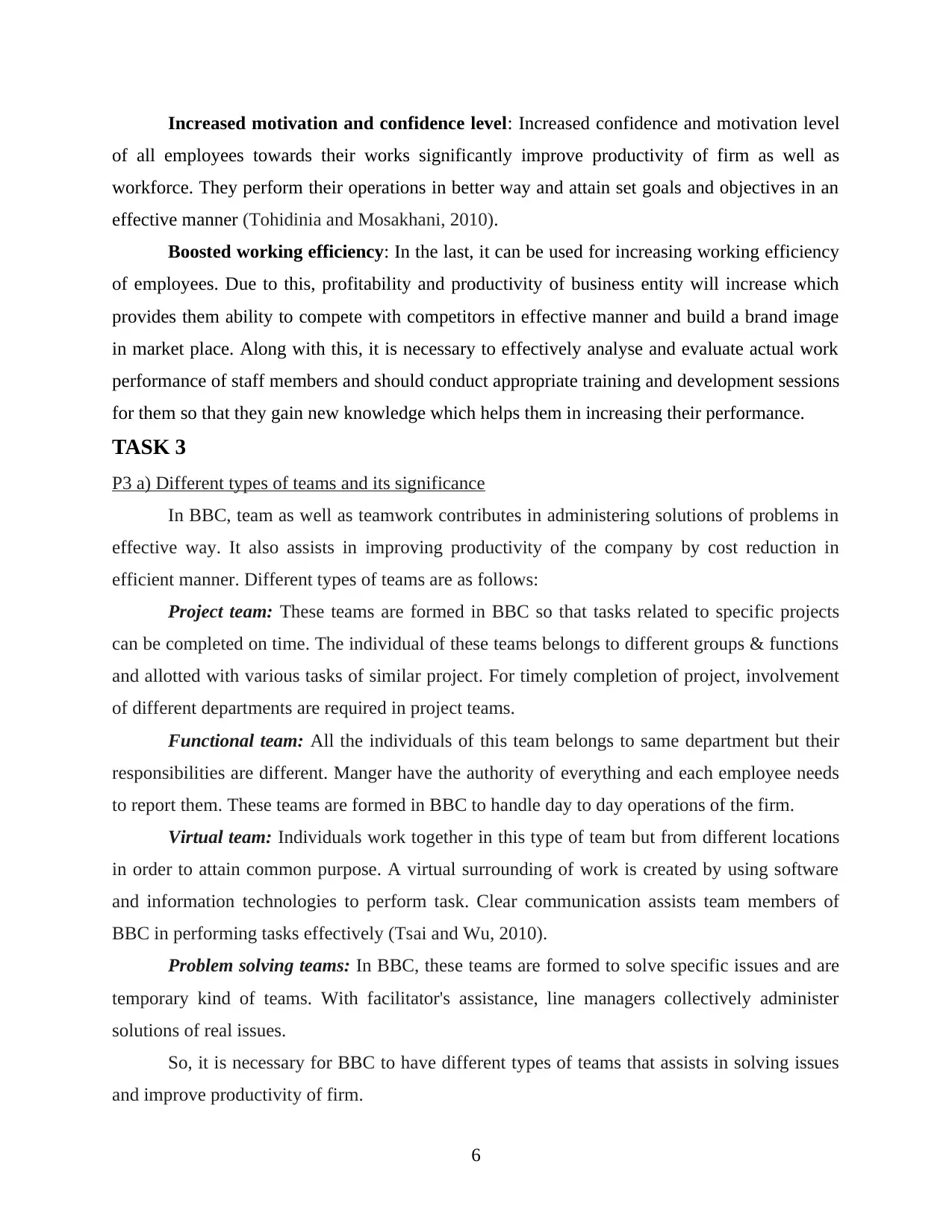
Increased motivation and confidence level: Increased confidence and motivation level
of all employees towards their works significantly improve productivity of firm as well as
workforce. They perform their operations in better way and attain set goals and objectives in an
effective manner (Tohidinia and Mosakhani, 2010).
Boosted working efficiency: In the last, it can be used for increasing working efficiency
of employees. Due to this, profitability and productivity of business entity will increase which
provides them ability to compete with competitors in effective manner and build a brand image
in market place. Along with this, it is necessary to effectively analyse and evaluate actual work
performance of staff members and should conduct appropriate training and development sessions
for them so that they gain new knowledge which helps them in increasing their performance.
TASK 3
P3 a) Different types of teams and its significance
In BBC, team as well as teamwork contributes in administering solutions of problems in
effective way. It also assists in improving productivity of the company by cost reduction in
efficient manner. Different types of teams are as follows:
Project team: These teams are formed in BBC so that tasks related to specific projects
can be completed on time. The individual of these teams belongs to different groups & functions
and allotted with various tasks of similar project. For timely completion of project, involvement
of different departments are required in project teams.
Functional team: All the individuals of this team belongs to same department but their
responsibilities are different. Manger have the authority of everything and each employee needs
to report them. These teams are formed in BBC to handle day to day operations of the firm.
Virtual team: Individuals work together in this type of team but from different locations
in order to attain common purpose. A virtual surrounding of work is created by using software
and information technologies to perform task. Clear communication assists team members of
BBC in performing tasks effectively (Tsai and Wu, 2010).
Problem solving teams: In BBC, these teams are formed to solve specific issues and are
temporary kind of teams. With facilitator's assistance, line managers collectively administer
solutions of real issues.
So, it is necessary for BBC to have different types of teams that assists in solving issues
and improve productivity of firm.
6
of all employees towards their works significantly improve productivity of firm as well as
workforce. They perform their operations in better way and attain set goals and objectives in an
effective manner (Tohidinia and Mosakhani, 2010).
Boosted working efficiency: In the last, it can be used for increasing working efficiency
of employees. Due to this, profitability and productivity of business entity will increase which
provides them ability to compete with competitors in effective manner and build a brand image
in market place. Along with this, it is necessary to effectively analyse and evaluate actual work
performance of staff members and should conduct appropriate training and development sessions
for them so that they gain new knowledge which helps them in increasing their performance.
TASK 3
P3 a) Different types of teams and its significance
In BBC, team as well as teamwork contributes in administering solutions of problems in
effective way. It also assists in improving productivity of the company by cost reduction in
efficient manner. Different types of teams are as follows:
Project team: These teams are formed in BBC so that tasks related to specific projects
can be completed on time. The individual of these teams belongs to different groups & functions
and allotted with various tasks of similar project. For timely completion of project, involvement
of different departments are required in project teams.
Functional team: All the individuals of this team belongs to same department but their
responsibilities are different. Manger have the authority of everything and each employee needs
to report them. These teams are formed in BBC to handle day to day operations of the firm.
Virtual team: Individuals work together in this type of team but from different locations
in order to attain common purpose. A virtual surrounding of work is created by using software
and information technologies to perform task. Clear communication assists team members of
BBC in performing tasks effectively (Tsai and Wu, 2010).
Problem solving teams: In BBC, these teams are formed to solve specific issues and are
temporary kind of teams. With facilitator's assistance, line managers collectively administer
solutions of real issues.
So, it is necessary for BBC to have different types of teams that assists in solving issues
and improve productivity of firm.
6
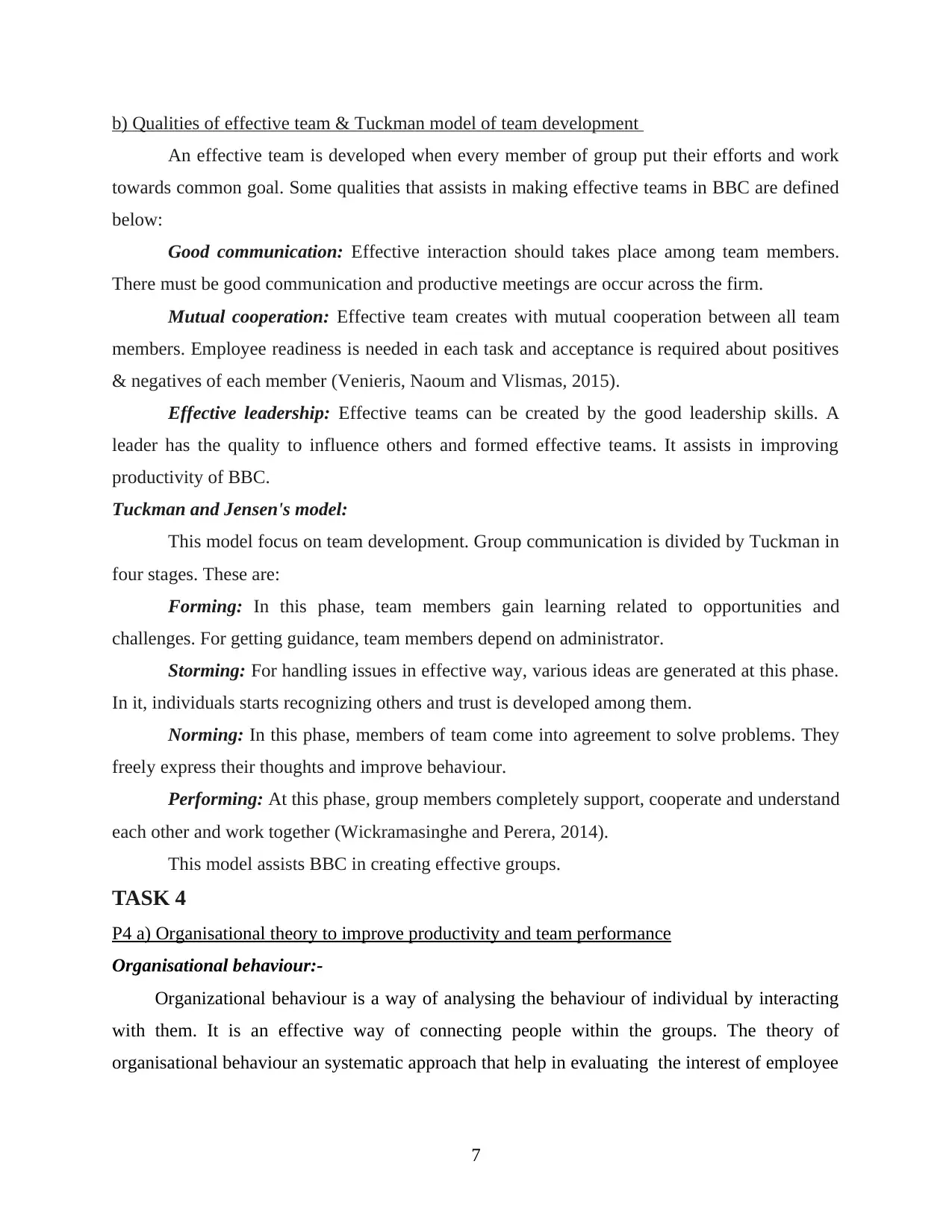
b) Qualities of effective team & Tuckman model of team development
An effective team is developed when every member of group put their efforts and work
towards common goal. Some qualities that assists in making effective teams in BBC are defined
below:
Good communication: Effective interaction should takes place among team members.
There must be good communication and productive meetings are occur across the firm.
Mutual cooperation: Effective team creates with mutual cooperation between all team
members. Employee readiness is needed in each task and acceptance is required about positives
& negatives of each member (Venieris, Naoum and Vlismas, 2015).
Effective leadership: Effective teams can be created by the good leadership skills. A
leader has the quality to influence others and formed effective teams. It assists in improving
productivity of BBC.
Tuckman and Jensen's model:
This model focus on team development. Group communication is divided by Tuckman in
four stages. These are:
Forming: In this phase, team members gain learning related to opportunities and
challenges. For getting guidance, team members depend on administrator.
Storming: For handling issues in effective way, various ideas are generated at this phase.
In it, individuals starts recognizing others and trust is developed among them.
Norming: In this phase, members of team come into agreement to solve problems. They
freely express their thoughts and improve behaviour.
Performing: At this phase, group members completely support, cooperate and understand
each other and work together (Wickramasinghe and Perera, 2014).
This model assists BBC in creating effective groups.
TASK 4
P4 a) Organisational theory to improve productivity and team performance
Organisational behaviour:-
Organizational behaviour is a way of analysing the behaviour of individual by interacting
with them. It is an effective way of connecting people within the groups. The theory of
organisational behaviour an systematic approach that help in evaluating the interest of employee
7
An effective team is developed when every member of group put their efforts and work
towards common goal. Some qualities that assists in making effective teams in BBC are defined
below:
Good communication: Effective interaction should takes place among team members.
There must be good communication and productive meetings are occur across the firm.
Mutual cooperation: Effective team creates with mutual cooperation between all team
members. Employee readiness is needed in each task and acceptance is required about positives
& negatives of each member (Venieris, Naoum and Vlismas, 2015).
Effective leadership: Effective teams can be created by the good leadership skills. A
leader has the quality to influence others and formed effective teams. It assists in improving
productivity of BBC.
Tuckman and Jensen's model:
This model focus on team development. Group communication is divided by Tuckman in
four stages. These are:
Forming: In this phase, team members gain learning related to opportunities and
challenges. For getting guidance, team members depend on administrator.
Storming: For handling issues in effective way, various ideas are generated at this phase.
In it, individuals starts recognizing others and trust is developed among them.
Norming: In this phase, members of team come into agreement to solve problems. They
freely express their thoughts and improve behaviour.
Performing: At this phase, group members completely support, cooperate and understand
each other and work together (Wickramasinghe and Perera, 2014).
This model assists BBC in creating effective groups.
TASK 4
P4 a) Organisational theory to improve productivity and team performance
Organisational behaviour:-
Organizational behaviour is a way of analysing the behaviour of individual by interacting
with them. It is an effective way of connecting people within the groups. The theory of
organisational behaviour an systematic approach that help in evaluating the interest of employee
7
⊘ This is a preview!⊘
Do you want full access?
Subscribe today to unlock all pages.

Trusted by 1+ million students worldwide
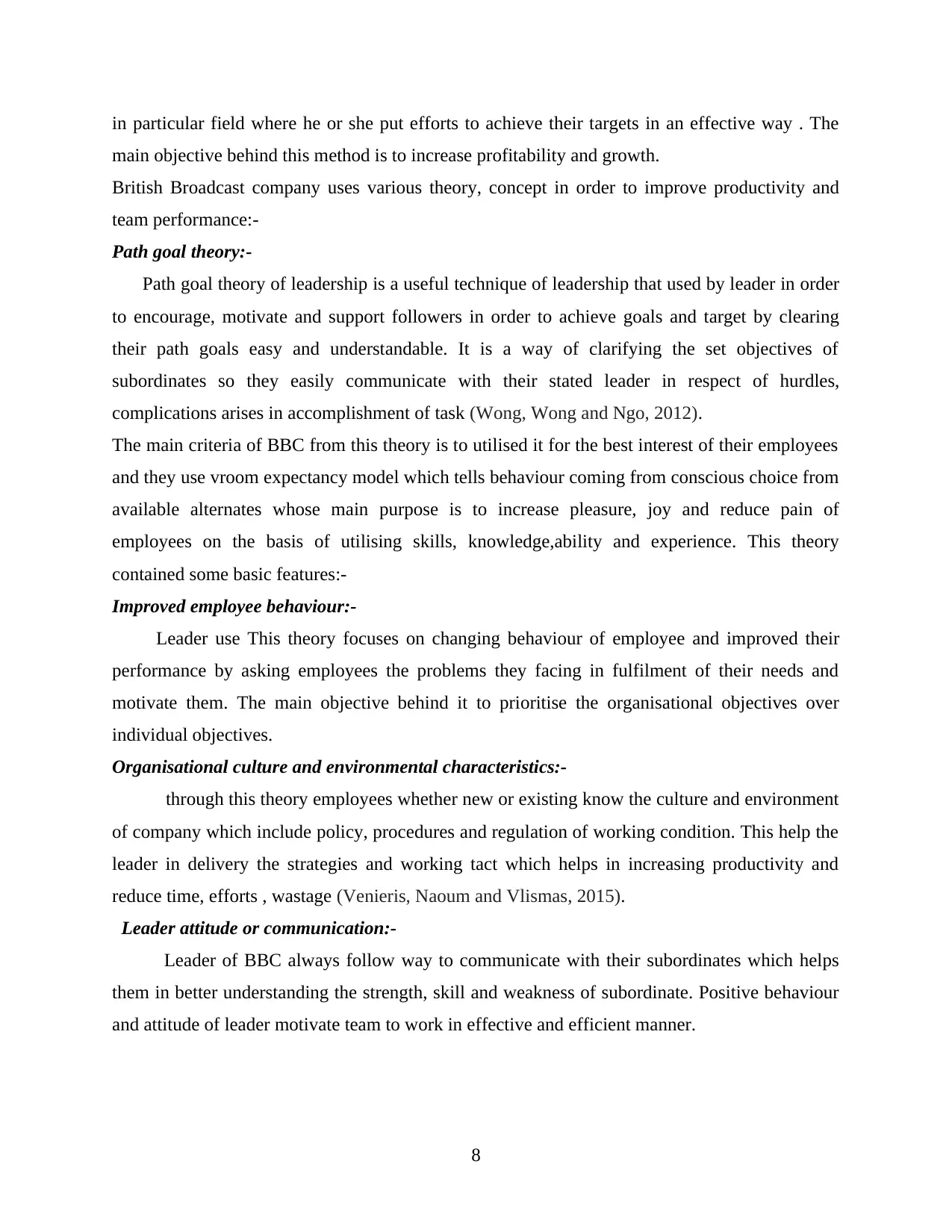
in particular field where he or she put efforts to achieve their targets in an effective way . The
main objective behind this method is to increase profitability and growth.
British Broadcast company uses various theory, concept in order to improve productivity and
team performance:-
Path goal theory:-
Path goal theory of leadership is a useful technique of leadership that used by leader in order
to encourage, motivate and support followers in order to achieve goals and target by clearing
their path goals easy and understandable. It is a way of clarifying the set objectives of
subordinates so they easily communicate with their stated leader in respect of hurdles,
complications arises in accomplishment of task (Wong, Wong and Ngo, 2012).
The main criteria of BBC from this theory is to utilised it for the best interest of their employees
and they use vroom expectancy model which tells behaviour coming from conscious choice from
available alternates whose main purpose is to increase pleasure, joy and reduce pain of
employees on the basis of utilising skills, knowledge,ability and experience. This theory
contained some basic features:-
Improved employee behaviour:-
Leader use This theory focuses on changing behaviour of employee and improved their
performance by asking employees the problems they facing in fulfilment of their needs and
motivate them. The main objective behind it to prioritise the organisational objectives over
individual objectives.
Organisational culture and environmental characteristics:-
through this theory employees whether new or existing know the culture and environment
of company which include policy, procedures and regulation of working condition. This help the
leader in delivery the strategies and working tact which helps in increasing productivity and
reduce time, efforts , wastage (Venieris, Naoum and Vlismas, 2015).
Leader attitude or communication:-
Leader of BBC always follow way to communicate with their subordinates which helps
them in better understanding the strength, skill and weakness of subordinate. Positive behaviour
and attitude of leader motivate team to work in effective and efficient manner.
8
main objective behind this method is to increase profitability and growth.
British Broadcast company uses various theory, concept in order to improve productivity and
team performance:-
Path goal theory:-
Path goal theory of leadership is a useful technique of leadership that used by leader in order
to encourage, motivate and support followers in order to achieve goals and target by clearing
their path goals easy and understandable. It is a way of clarifying the set objectives of
subordinates so they easily communicate with their stated leader in respect of hurdles,
complications arises in accomplishment of task (Wong, Wong and Ngo, 2012).
The main criteria of BBC from this theory is to utilised it for the best interest of their employees
and they use vroom expectancy model which tells behaviour coming from conscious choice from
available alternates whose main purpose is to increase pleasure, joy and reduce pain of
employees on the basis of utilising skills, knowledge,ability and experience. This theory
contained some basic features:-
Improved employee behaviour:-
Leader use This theory focuses on changing behaviour of employee and improved their
performance by asking employees the problems they facing in fulfilment of their needs and
motivate them. The main objective behind it to prioritise the organisational objectives over
individual objectives.
Organisational culture and environmental characteristics:-
through this theory employees whether new or existing know the culture and environment
of company which include policy, procedures and regulation of working condition. This help the
leader in delivery the strategies and working tact which helps in increasing productivity and
reduce time, efforts , wastage (Venieris, Naoum and Vlismas, 2015).
Leader attitude or communication:-
Leader of BBC always follow way to communicate with their subordinates which helps
them in better understanding the strength, skill and weakness of subordinate. Positive behaviour
and attitude of leader motivate team to work in effective and efficient manner.
8
Paraphrase This Document
Need a fresh take? Get an instant paraphrase of this document with our AI Paraphraser
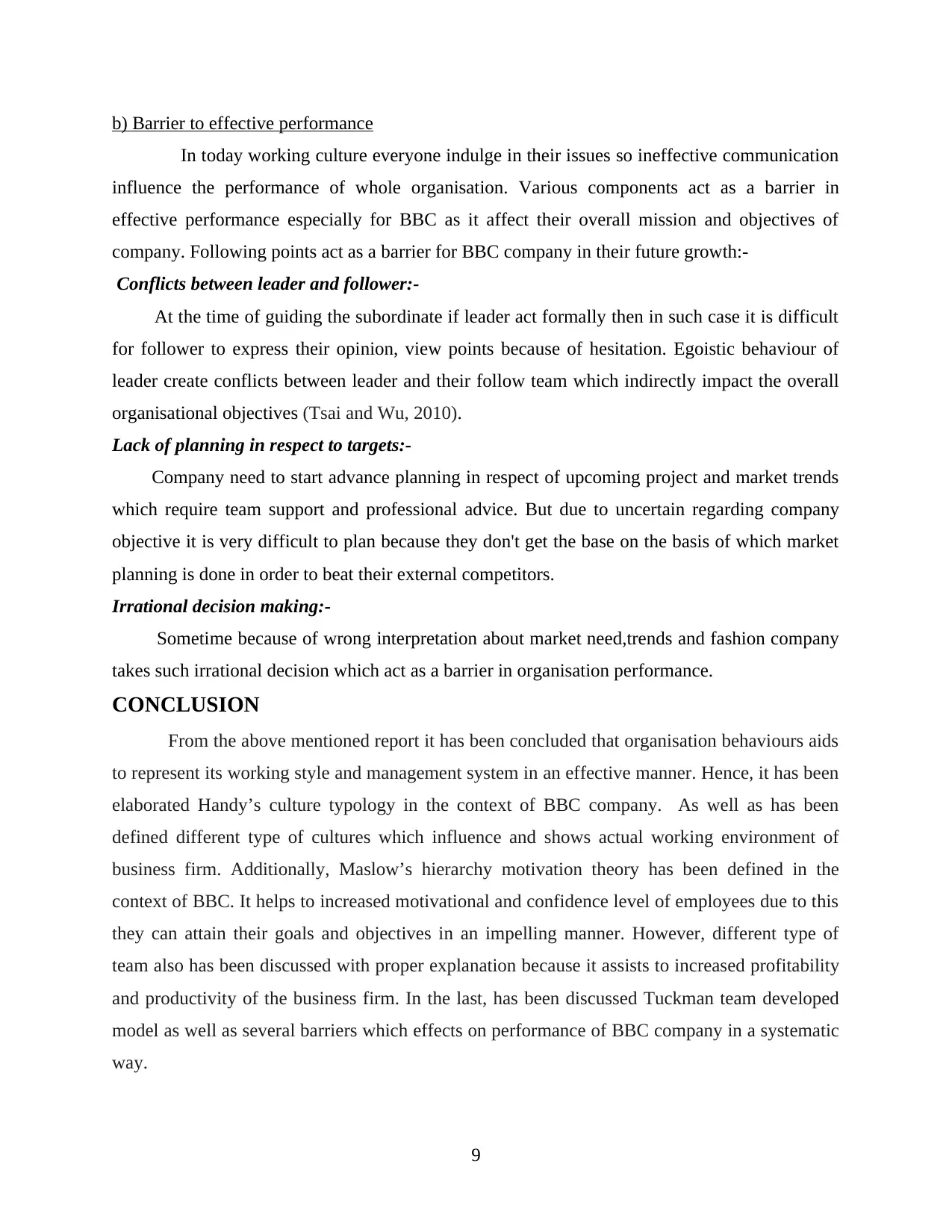
b) Barrier to effective performance
In today working culture everyone indulge in their issues so ineffective communication
influence the performance of whole organisation. Various components act as a barrier in
effective performance especially for BBC as it affect their overall mission and objectives of
company. Following points act as a barrier for BBC company in their future growth:-
Conflicts between leader and follower:-
At the time of guiding the subordinate if leader act formally then in such case it is difficult
for follower to express their opinion, view points because of hesitation. Egoistic behaviour of
leader create conflicts between leader and their follow team which indirectly impact the overall
organisational objectives (Tsai and Wu, 2010).
Lack of planning in respect to targets:-
Company need to start advance planning in respect of upcoming project and market trends
which require team support and professional advice. But due to uncertain regarding company
objective it is very difficult to plan because they don't get the base on the basis of which market
planning is done in order to beat their external competitors.
Irrational decision making:-
Sometime because of wrong interpretation about market need,trends and fashion company
takes such irrational decision which act as a barrier in organisation performance.
CONCLUSION
From the above mentioned report it has been concluded that organisation behaviours aids
to represent its working style and management system in an effective manner. Hence, it has been
elaborated Handy’s culture typology in the context of BBC company. As well as has been
defined different type of cultures which influence and shows actual working environment of
business firm. Additionally, Maslow’s hierarchy motivation theory has been defined in the
context of BBC. It helps to increased motivational and confidence level of employees due to this
they can attain their goals and objectives in an impelling manner. However, different type of
team also has been discussed with proper explanation because it assists to increased profitability
and productivity of the business firm. In the last, has been discussed Tuckman team developed
model as well as several barriers which effects on performance of BBC company in a systematic
way.
9
In today working culture everyone indulge in their issues so ineffective communication
influence the performance of whole organisation. Various components act as a barrier in
effective performance especially for BBC as it affect their overall mission and objectives of
company. Following points act as a barrier for BBC company in their future growth:-
Conflicts between leader and follower:-
At the time of guiding the subordinate if leader act formally then in such case it is difficult
for follower to express their opinion, view points because of hesitation. Egoistic behaviour of
leader create conflicts between leader and their follow team which indirectly impact the overall
organisational objectives (Tsai and Wu, 2010).
Lack of planning in respect to targets:-
Company need to start advance planning in respect of upcoming project and market trends
which require team support and professional advice. But due to uncertain regarding company
objective it is very difficult to plan because they don't get the base on the basis of which market
planning is done in order to beat their external competitors.
Irrational decision making:-
Sometime because of wrong interpretation about market need,trends and fashion company
takes such irrational decision which act as a barrier in organisation performance.
CONCLUSION
From the above mentioned report it has been concluded that organisation behaviours aids
to represent its working style and management system in an effective manner. Hence, it has been
elaborated Handy’s culture typology in the context of BBC company. As well as has been
defined different type of cultures which influence and shows actual working environment of
business firm. Additionally, Maslow’s hierarchy motivation theory has been defined in the
context of BBC. It helps to increased motivational and confidence level of employees due to this
they can attain their goals and objectives in an impelling manner. However, different type of
team also has been discussed with proper explanation because it assists to increased profitability
and productivity of the business firm. In the last, has been discussed Tuckman team developed
model as well as several barriers which effects on performance of BBC company in a systematic
way.
9
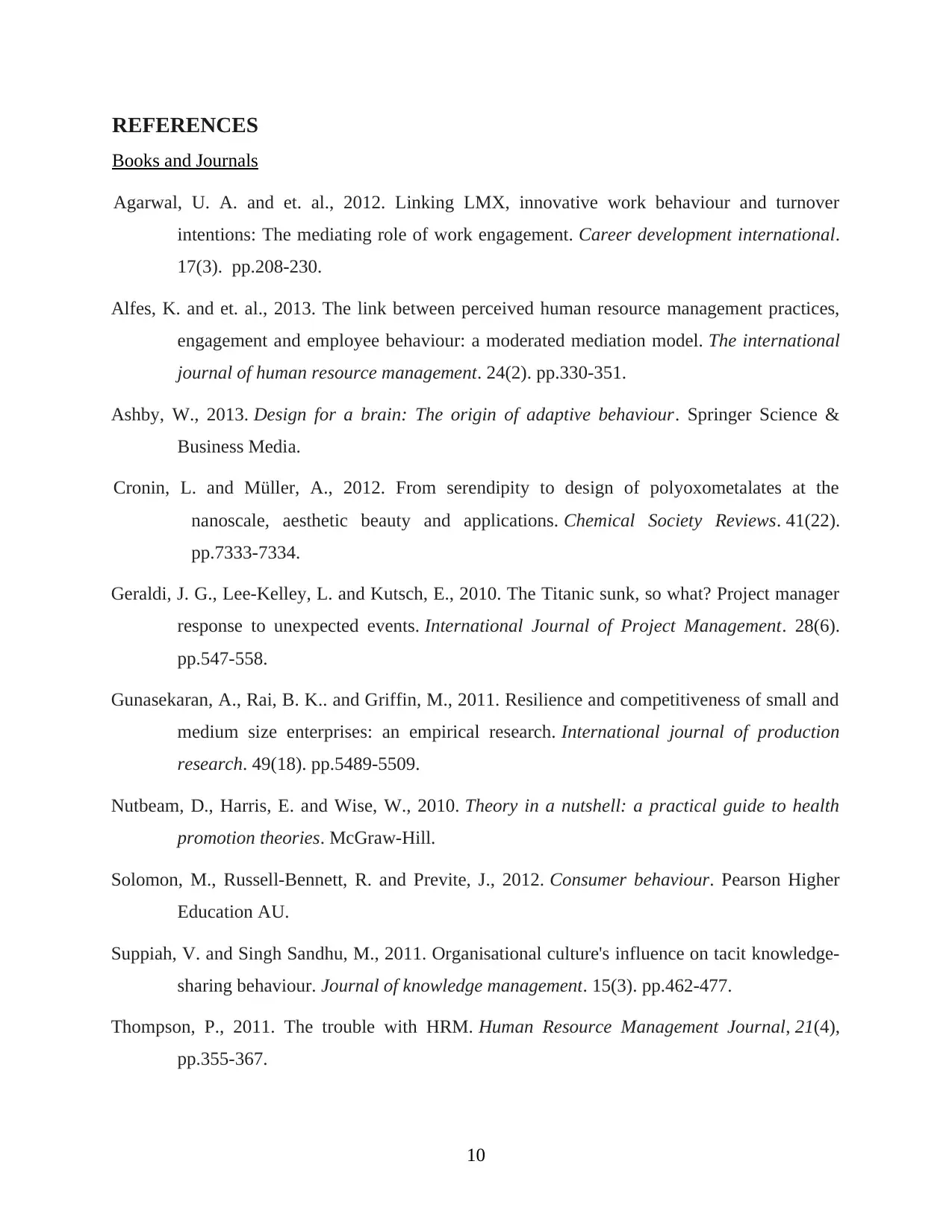
REFERENCES
Books and Journals
Agarwal, U. A. and et. al., 2012. Linking LMX, innovative work behaviour and turnover
intentions: The mediating role of work engagement. Career development international.
17(3). pp.208-230.
Alfes, K. and et. al., 2013. The link between perceived human resource management practices,
engagement and employee behaviour: a moderated mediation model. The international
journal of human resource management. 24(2). pp.330-351.
Ashby, W., 2013. Design for a brain: The origin of adaptive behaviour. Springer Science &
Business Media.
Cronin, L. and Müller, A., 2012. From serendipity to design of polyoxometalates at the
nanoscale, aesthetic beauty and applications. Chemical Society Reviews. 41(22).
pp.7333-7334.
Geraldi, J. G., Lee-Kelley, L. and Kutsch, E., 2010. The Titanic sunk, so what? Project manager
response to unexpected events. International Journal of Project Management. 28(6).
pp.547-558.
Gunasekaran, A., Rai, B. K.. and Griffin, M., 2011. Resilience and competitiveness of small and
medium size enterprises: an empirical research. International journal of production
research. 49(18). pp.5489-5509.
Nutbeam, D., Harris, E. and Wise, W., 2010. Theory in a nutshell: a practical guide to health
promotion theories. McGraw-Hill.
Solomon, M., Russell-Bennett, R. and Previte, J., 2012. Consumer behaviour. Pearson Higher
Education AU.
Suppiah, V. and Singh Sandhu, M., 2011. Organisational culture's influence on tacit knowledge-
sharing behaviour. Journal of knowledge management. 15(3). pp.462-477.
Thompson, P., 2011. The trouble with HRM. Human Resource Management Journal, 21(4),
pp.355-367.
10
Books and Journals
Agarwal, U. A. and et. al., 2012. Linking LMX, innovative work behaviour and turnover
intentions: The mediating role of work engagement. Career development international.
17(3). pp.208-230.
Alfes, K. and et. al., 2013. The link between perceived human resource management practices,
engagement and employee behaviour: a moderated mediation model. The international
journal of human resource management. 24(2). pp.330-351.
Ashby, W., 2013. Design for a brain: The origin of adaptive behaviour. Springer Science &
Business Media.
Cronin, L. and Müller, A., 2012. From serendipity to design of polyoxometalates at the
nanoscale, aesthetic beauty and applications. Chemical Society Reviews. 41(22).
pp.7333-7334.
Geraldi, J. G., Lee-Kelley, L. and Kutsch, E., 2010. The Titanic sunk, so what? Project manager
response to unexpected events. International Journal of Project Management. 28(6).
pp.547-558.
Gunasekaran, A., Rai, B. K.. and Griffin, M., 2011. Resilience and competitiveness of small and
medium size enterprises: an empirical research. International journal of production
research. 49(18). pp.5489-5509.
Nutbeam, D., Harris, E. and Wise, W., 2010. Theory in a nutshell: a practical guide to health
promotion theories. McGraw-Hill.
Solomon, M., Russell-Bennett, R. and Previte, J., 2012. Consumer behaviour. Pearson Higher
Education AU.
Suppiah, V. and Singh Sandhu, M., 2011. Organisational culture's influence on tacit knowledge-
sharing behaviour. Journal of knowledge management. 15(3). pp.462-477.
Thompson, P., 2011. The trouble with HRM. Human Resource Management Journal, 21(4),
pp.355-367.
10
⊘ This is a preview!⊘
Do you want full access?
Subscribe today to unlock all pages.

Trusted by 1+ million students worldwide
1 out of 13
Related Documents
Your All-in-One AI-Powered Toolkit for Academic Success.
+13062052269
info@desklib.com
Available 24*7 on WhatsApp / Email
![[object Object]](/_next/static/media/star-bottom.7253800d.svg)
Unlock your academic potential
Copyright © 2020–2026 A2Z Services. All Rights Reserved. Developed and managed by ZUCOL.





